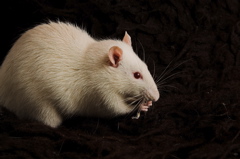A magazine where the digital world meets the real world.
On the web
- Home
- Browse by date
- Browse by topic
- Enter the maze
- Follow our blog
- Follow us on Twitter
- Resources for teachers
- Subscribe
In print
What is cs4fn?
- About us
- Contact us
- Partners
- Privacy and cookies
- Copyright and contributions
- Links to other fun sites
- Complete our questionnaire, give us feedback
Search:
Scientific Thinking? Rats!
Why is scientific method so important? Because sometimes we can be too clever for our own good! So much so that even lab rats can out-think us in intelligence experiments!

Humans have a natural ability to quickly jump to conclusions from the evidence around us. From seeing a few examples of flying birds we decide that birds can fly. This is such a powerful part of the way we think that once we have an idea about a rule of the world it can be hard to shake it off even when it flies in the face of the evidence - as long as some evidence seems to support it. We see penguins but still we claim if asked that what makes something a bird is that it can fly. Most of the time this is really useful way to think as it helps us survive. After all if you've seen one lion kill it's quite useful to automatically and strongly believe all lions are dangerous and scarper when a lion is wandering around.
It can be a big problem in other modern life and death situations though. There have been situations for example when pilots have let their plane plummet into the ground, not realising anything was wrong until the last seconds. This is despite the fact that they must have been able to feel the way the plane was dropping. They ignored the evidence saying otherwise because they had already formed a strong belief given that their instruments seemed to be saying that they were descending gently.
Rat Intelligence
A rat experiment showed how our desre to create rules about the world from limited evidence and then stick to them aren't always the best way to make sense of the world. The researchers concerned set up a standard lab rat test. The rats were shown a screen where dots appeared. If a dot appeared in the top half of the screen then pressing a lever would give them a reward. If the dot appeared in the bottom they wouldn't get a reward. The rats didn't know that of course, they had to work it out. Most of the dots were in the top half so there were rewards most of the time. The test's challenge was whether the rats could maximize their rewards be learning an appropriate strategy over when to press the lever. The rats learnt to just press the lever every time a dot appeared. That way they always got food if it was available.
Human Intelligence
So much for rat intelligence. The researchers then gave the same test to humans. Surprisingly given how clever we think we are, the humans did worse than the rats, getting fewer rewards. What went wrong? The humans tried to work out the rule behind the rewards and from the early pattern of where dots appeared and whether there were rewards formed rules that were wrong. Unfortunately they then convinced themselves they had worked it out, even when sometimes they didn't get a reward they expected. They thus ignored the occasional evidence that showed their belief was wrong. Instead they focussed on the evidence they saw that confirmed their rule. That meant that sometimes they didn't get a reward that was there for the taking, because they didn't press the lever! Of course because they then didn't press the lever, that belief wasn't challenged on those occasions either.
Science is not a collection of facts, but a powerful way of understanding the world, that keeps our thinking biases in check. Whatever individuals think, the scientific community only come to accept facts when lots of evidence supports it, when it has successfully made predictions, and more convincingly when people trying to disprove it fail to find hard evidence against. When there is evidence against it isn't ignored, instead new studies are set up to find out more. It is far too easy otherwise, as the rat experiment shows, for us to only see the evidence that confirms what we already believe to be true and ignore the rest.


